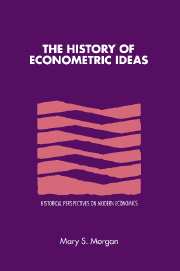Book contents
Introduction to formal models
Published online by Cambridge University Press: 26 October 2009
Summary
The last part of this book examines how econometricians formalised and generalised their ideas on the relationship between economic theory and economic data. We see that they developed three formal models of the way in which observed statistical relationships might correspond to their expected theoretical relationships. Each model provided an explanation of the data-theory gap and a rationalisation of the approximate, rather than exact, fit found in measured economic laws. One model explained these approximations in terms of measurement errors: the errors-in-variables model. Another explanation rested on variables omitted from the measurement equation: the errors-inequations model. The third model provided a more general explanation of the relationship between empirical results and economic theory by treating the theoretical relationship as probabilistic. Each of the three models was associated with an appropriate statistical analysis.
So far, this history has concentrated on the development of econometrics within its applied context. Econometricians have been portrayed as responding (not always successfully) to problems thrown up in their applied work. These last chapters provide a more integrated history of the field. They draw both on the applied work of the period (discussed in the earlier chapters) and on the theoretical discussions of econometricians, which began in earnest only in the 1930s. In particular, Chapter 7 offers a synthetic reconstruction of the development of the ideas involved in formal models. It concentrates on the development of the errors-in-equations and errors-in-variables models and brings in the probability model only briefly.
- Type
- Chapter
- Information
- The History of Econometric Ideas , pp. 193Publisher: Cambridge University PressPrint publication year: 1990



